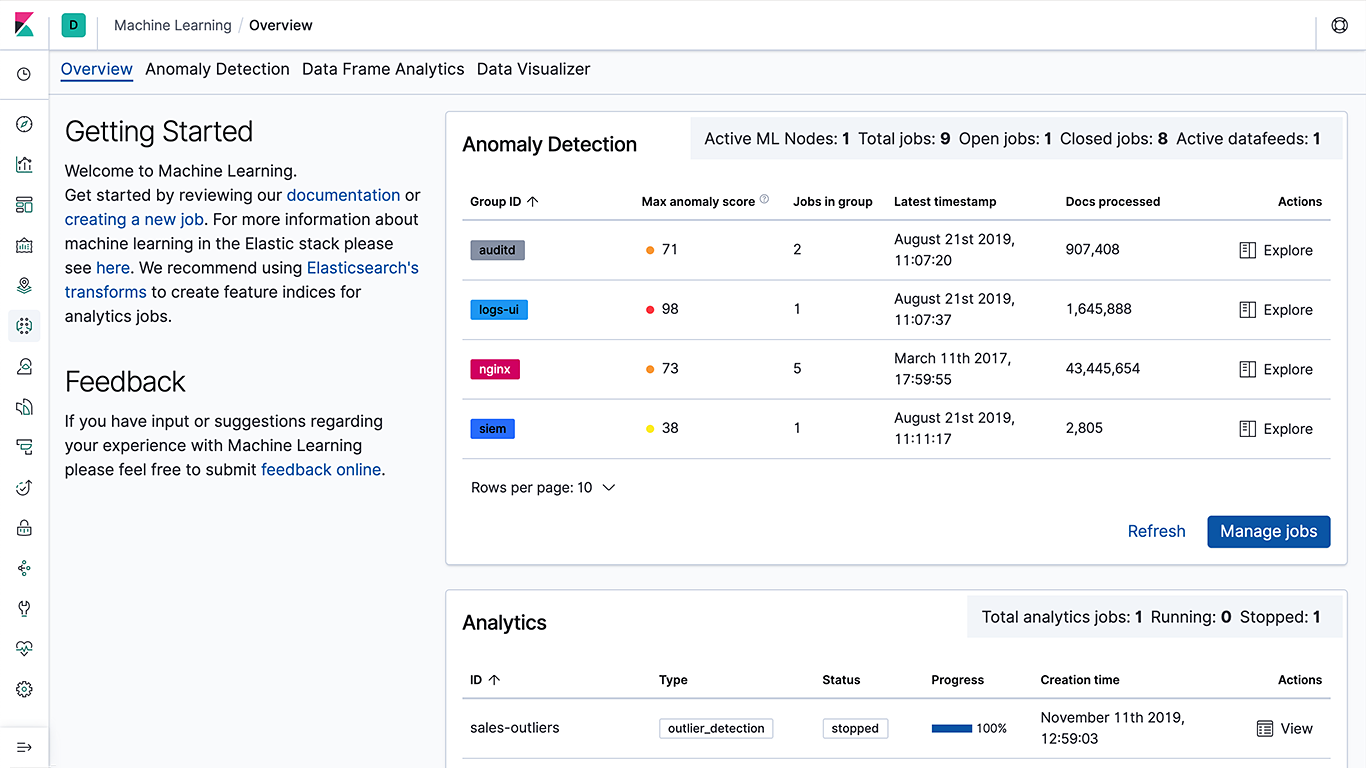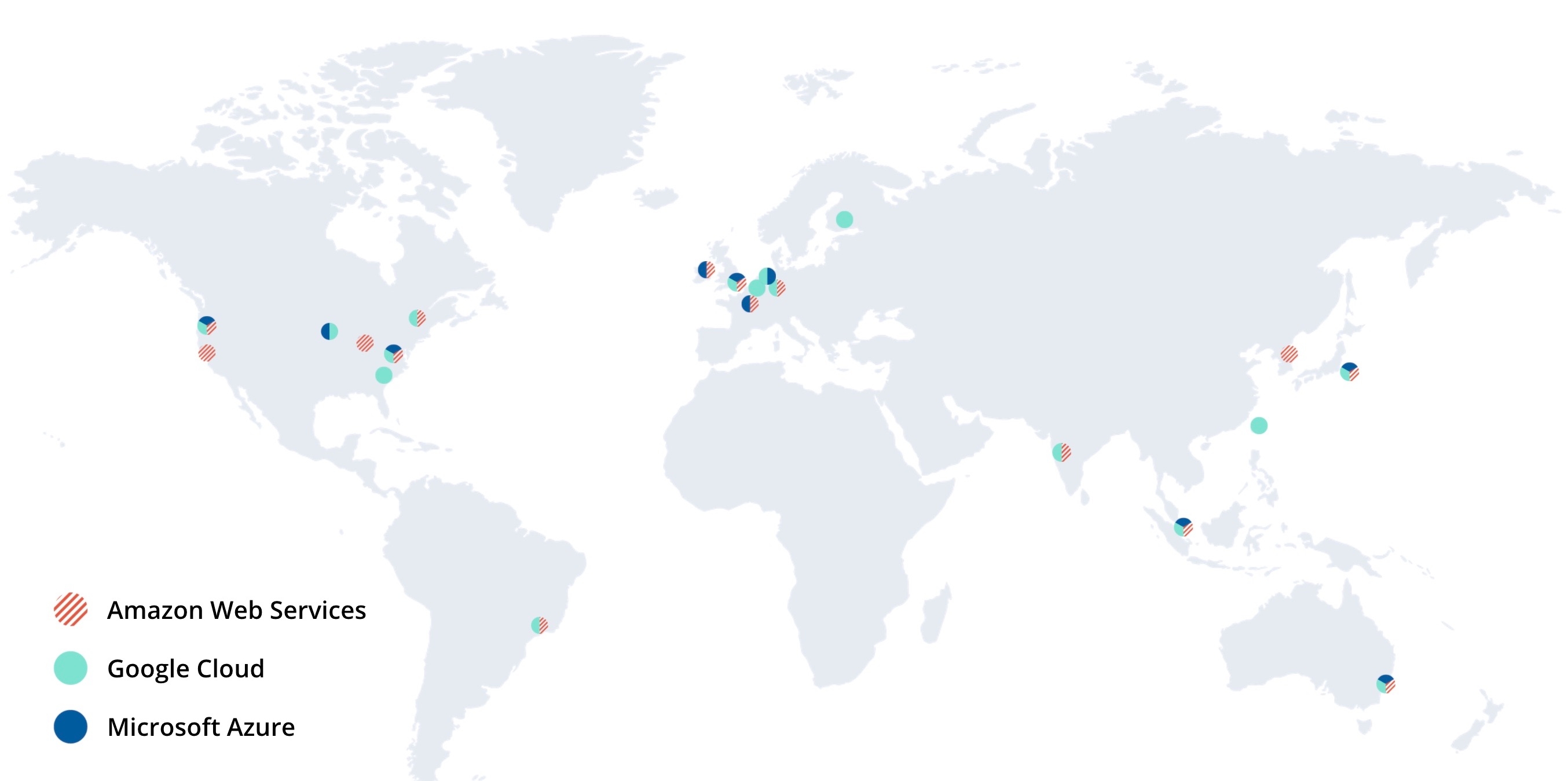

What's New
Performance testing
Elasticsearch outperforms OpenSearch by 40%-140% while using less resources. Dive into our article comparing them across crucial areas. Make the right decision for your search, observability or security use cases.
Our findings were validated by a third party. An assessment was made of Elasticsearch's superior performance in speed, scale, resource optimization, and cost efficiency.
What is the OpenSearch project?
The OpenSearch project, created by Amazon, is a forked search project based on old versions of Elasticsearch and Kibana. These projects were created primarily to support Amazon OpenSearch Service (formerly Amazon Elasticsearch Service). Amazon OpenSearch Service will not deliver current or future releases of Elasticsearch and Kibana.
While the forked project was not production ready at the time of initial announcement, a generally available (GA) release of OpenSearch is now available.
Are Elasticsearch and Kibana free and open?
Yes, Elasticsearch and Kibana continue to be free and open. Free means our products can be used at no cost, and users can get started, or even build an entire solution without ever having to pay for the Elastic (ELK) Stack. Open means our code is housed in public repositories with a commitment to an open development process and transparent and direct engagement with our community.
The change from the Apache License to the Elastic License v2 was a response to the continued non-collaborative engagement AWS pursued with Elasticsearch. As explained in multiple blogs and publications, this will have no impact on the vast majority of our customers and community members, and we continue to keep an open door for any partner that wants to discuss how they can continue to use our products.

Find out more about why Elastic believes in free and open.
Why was the OpenSearch project fork created from Elasticsearch and Kibana?
As of release 7.11 (in February 2021), Elastic changed the license of our products to the Elastic License v2 (ELv2) and SSPL. This was a response to Amazon’s non-collaborative behavior and misuse of our trademark. Our products remain free and open, but Amazon can no longer freely use Elasticsearch and Kibana products without collaborating with us. Rather than collaborate with us and contribute back, Amazon created its own forked projects, which are less mature, not ready for production use, and provide inferior capabilities compared to Elasticsearch and Kibana.
Does Amazon OpenSearch Service have any features not available in Elasticsearch?
The Amazon OpenSearch Service announcement blog by AWS lists a number of features on OpenSearch that are not available in “open source Elasticsearch”. This is not a meaningful comparison between OpenSearch and Elasticsearch, as new Elasticsearch features since 2018 have been delivered under the Elastic License.
- Features like Advanced Security, SQL Query Syntax, Reporting, Asynchronous Search, Trace Analytics, Alerting, and Kibana Dashboards (with advanced user experience and visualization enablers like Canvas and Lens, available only on Elastic), are already available on Elasticsearch and Kibana.
- Capabilities listed as “available on OpenSearch but not on open source Elasticsearch” include Anomaly Detection, Index Management, and Performance Analyzer - which are in reality, capabilities Elastic has launched, invested in, and evolved over several years. Elastic’s machine learning and anomaly detection capabilities offer broader coverage, including statistical rarity detection, temporal deviation, and supervised learning to build highly custom models. Index Lifecycle Management (ILM) is a mature capability on Elasticsearch, extending beyond index management to a full data lifecycle management and automation framework. Elasticsearch ILM includes adjacent capabilities including Data tiers, Searchable Snapshots and four distinct storage tiers for a range of price-performance trade off options. And customers can monitor and troubleshoot Elasticsearch using a built-in monitoring UI and over API.
What makes Elasticsearch and Kibana better?
Elasticsearch outperforms in speed, scale, and efficiency – achieving the following results across standard customer use cases:
- 76% faster simple text queries
- 140% faster sorting
- 81% faster date histogram aggregations
- 108% faster terms queries
- 37% less resource utilization
Elasticsearch was named a Leader in the 2022 Gartner® Magic Quadrant™ for Insight Engines report. A study by Forrester Consulting revealed that Elasticsearch customers realize a 293% return on investment improvement within three years including increased profitability, employee and IT productivity gains, and license and recruiting cost savings.
Elasticsearch and Kibana also deliver superior product capabilities and maturity, a cloud agnostic product that is deeply integrated into multiple clouds, and technology expertise built on a decade of working on these products.
Elastic, the company behind Elasticsearch, Kibana, and the Elastic (ELK) Stack, also delivers a managed Elasticsearch service on all major clouds, including AWS, through Elastic Cloud.
Elasticsearch and Kibana offer superior product capabilities and maturity: Search and data analytics are rapidly evolving technology domains, and products in this space reflect this pace of technology progress. Elasticsearch keeps up with this momentum and delivers multiple architectural and functionality enhancements to its search experience with every release.
In 2018, Elastic made an intentional decision to release new feature developments under the Elastic License, which keeps our code and products free and open but prevents Amazon from taking these new Elasticsearch features and delivering them as a service. These new features include:
- Drag-and-drop data visualization with Elastic Maps and Kibana Lens
- Security analytics and threat hunting with Elastic Security for SIEM and endpoint security
- Elastic web crawler
- A full observability suite with an integrated experience including APM, logging, and analysis
- A powerful and proven correlation language (EQL) which powers our ready to use detection engine
- Broad architectural enhancements like data tiers and machine learning-based anomaly detection, built on years of research and iterations against real world use cases
These, as well as other major features introduced over the last three years, were built and delivered under the Elastic License, and are not available for Amazon or the OpenSearch project.

Elasticsearch and Kibana are cloud-neutral by design: Elastic developed Elasticsearch, Kibana, and the ELK Stack under strict pillars of cloud and location neutrality. All major capabilities are built into Elastic (ELK) Stack, and available to all customers, without taking on any proprietary dependencies. A key example of this is machine learning, built into Elasticsearch and readily available to all customers, without dependencies on any specific proprietary external services. We do not believe this to be the case with the new forks, which are primarily built for and governed by AWS.
In contrast, Elastic offers Elastic Cloud in over 40 regions across multiple cloud providers — including Microsoft, Google, and AWS — with built-in integrations for multiple cloud and on premises environments.

Elasticsearch and Kibana are enabled by Elastic’s decade-long search technology experience and investment: The momentum of innovations in Elasticsearch is enabled by the decade-long experience and expertise Elastic has developed and invested into building and operating Elasticsearch and Kibana. Elastic created these products, and we have over 800 engineers who are dedicated to innovating on these products. We make these products available to customers on premises and on major clouds, offering a consistent and integrated experience across these deployment choices. Elastic engineers have been the technical leaders on Elasticsearch and have represented the overwhelming majority of contributions to the product (over 96% based on this estimate). To put this in perspective, GitHub statistics show that out of the tens of thousands of commits to Elasticsearch between 2010 and 2021, AWS contributed only a handful.
AWS and Amazon OpenSearch Service, like all other members in the community, have benefited from the momentum of Elasticsearch and Kibana innovations. But Amazon does not have the deep technology expertise around search that enables Elastic to innovate on these products. As a notable technology leader said, “there is no compression algorithm for experience.” The OpenSearch project will not have access to the expertise and experience that have powered Elasticsearch for the last 10 years, and this will be felt in the pace of innovation seen in these projects.
How is OpenSearch good for AWS customers?
To put it bluntly, for a company that puts customers above all, this move clearly hurts Amazon customers by inflicting on them avoidable changes and subpar products rather than collaborating with Elastic to create a better user experience. Other cloud providers around the world, including Google and Microsoft, collaborate with Elastic to bring a complete, consistent, and unified Elasticsearch experience to their customers.
How is the OpenSearch project related to Amazon Elasticsearch Service (now Amazon OpenSearch Service)? Are these the same?
AWS has replaced Amazon Elasticsearch Service with its "successor," Amazon OpenSearch Service. Amazon Elasticsearch Service was launched in 2015, based on Elasticsearch version 1.5.2. This was not a collaboration with Elastic, as we have highlighted in previous blogs, despite Amazon's suggestions misrepresenting the engagement. With the change of name to Amazon OpenSearch Service, the service will no longer offer current or future versions of Elasticsearch, and will instead offer older versions of open source Elasticsearch (releases prior to 7.10.2) and OpenSearch.
Today, Amazon OpenSearch Service includes several proprietary features that are not available in open source. These include recent announcements like AWS UltraWarm and Auto-Tune, which are proprietary features not available in the forked open source projects. We expect this to be the case moving forward as well, and that the Amazon service will not be the same as the OpenSearch project.
If I am using Amazon Elasticsearch Service, how am I affected?
Amazon Elasticsearch Service is based on an old version of Elasticsearch. Historically, new versions, security patches, and new capabilities in Amazon Elasticsearch Service came largely from improvements in Elasticsearch and Kibana, developed by Elastic. Customers choosing to stay on Amazon’s service will no longer benefit from patches and performance enhancements delivered into Elasticsearch and Kibana. In addition, Elasticsearch deployments on customer premises and on other clouds will no longer be the same as Amazon’s service, and portability/migration between services will become harder over time.
Customers can move to the Elasticsearch Service delivered by Elastic, with Elastic Cloud on AWS, to continue using an Elasticsearch-managed service delivered within the AWS cloud. Customers can easily migrate to the official Elastic Cloud by following these steps.
Migrate from Amazon OpenSearch Service
Migrate to Elastic Cloud on AWS, the official Elasticsearch service on AWS from Elastic.
Get started with Elastic Cloud today
Start your free Elastic Cloud on AWS trial today. No credit card required.
Amazon, AWS, OpenSearch and other related marks are trademarks of Amazon.com, Inc. or its affiliates. All other brand names, product names, or trademarks belong to their respective owners.











